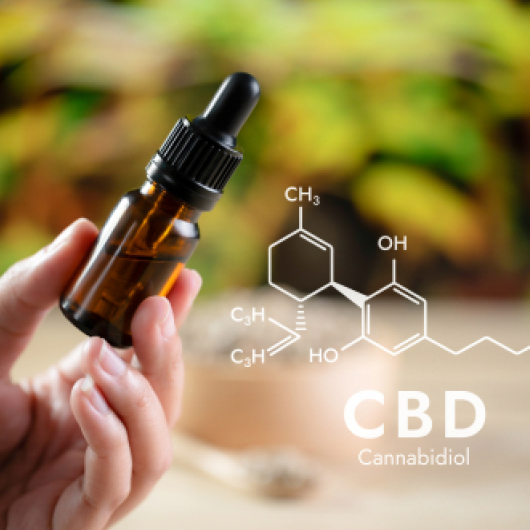THC and CBD: ratio in finished medical products

The cannabinoids THC (tetrahydrocannabinol) and CBD (cannabidiol) are gaining attention in the medical field. Both are derived from cannabis and have unique properties that can be useful in the treatment of a variety of conditions. An important factor in the use of these cannabinoids is the percentage of THC and CBD in finished medical products.
In this article, we will take a look at the cannabinoids THC and CBD, their properties, and how the percentage of THC and CBD in medical products affects them.
THC and CBD: the two main cannabinoids
THC and CBD are the two main cannabinoids found in cannabis. However, they have different chemical structures and effects on the human body. THC is a psychoactive substance that causes euphoria and altered consciousness in the user. CBD, on the other hand, has no psychoactive properties and does not cause a "high" or altered state of consciousness.

THC: a psychoactive substance with anti-inflammatory and analgesic properties
In addition to its psychoactive properties, THC has anti-inflammatory and analgesic properties. It is valuable in the treatment of chronic pain, glaucoma and some neurological disorders. Its anti-inflammatory properties reduce inflammation in the body, relieving pain and promoting healing. THC has analgesic effects, relieving severe pain in patients.
Psychoactive properties of THC
It should be noted that high doses of THC can cause side effects. The psychoactive properties of THC can cause euphoria, mood changes and altered perception. In some people it can cause anxiety, paranoia and cognitive decline. It is therefore important to monitor the dose of THC and to use it under medical supervision.
THC's anti-inflammatory and analgesic properties
THC has anti-inflammatory and analgesic properties that are useful for medical purposes. It can help with inflammatory conditions such as rheumatoid arthritis or inflammatory bowel disease. THC also relieves severe pain, including chronic pain and cancer pain.
Side effects of high doses of THC
THC has beneficial properties, but high doses can cause unwanted side effects, such as dry mouth, dizziness, rapid heartbeat or increased appetite are possible. Controlling the dose of THC is important to avoid these effects. A high dose of THC can cause discomfort and negative effects for the patient.

CBD: a non-psychoactive compound with beneficial properties
Unlike THC, CBD has no psychoactive properties and does not cause an alteration of consciousness in the user. It does have a number of beneficial properties that make it valuable in the medical field. CBD exhibits anti-inflammatory, anti-epileptic, and anxiolytic (anti-angst) properties. This means that CBD can help reduce inflammation, control epileptic seizures, and alleviate anxiety in patients.
Lack of psychoactive effects of CBD
One of the main benefits of CBD is its lack of psychoactive effects. Patients can benefit from the use of CBD without experiencing changes in their consciousness or mood. This makes it safe to use and allows patients to continue their daily activities without problems.
Anti-inflammatory, antiepileptic, and anxiolytic properties of CBD
CBD exhibits antiepileptic properties and can be effective in controlling epileptic seizures in patients with epilepsy, including childhood epilepsy such as Dravet syndrome.
CBD also has anxiolytic properties. This means that it can help manage anxiety states and reduce fear and anxiety levels in patients.
CBD's role in reducing side effects
Adding CBD in the right ratio reduces the psychoactive effects of THC and the risk of adverse side effects, providing patients with the therapeutic benefits of THC without the negative effects.
Percentage ratio of THC to CBD in medical products
The percentage of THC and CBD in finished medical products is important in determining their potential therapeutic effects and possible adverse reactions. Different products may have different levels of THC and CBD, depending on the specific intended effect and legislation in a particular country or region.
For example, some medical products may contain only CBD without THC. This may be preferable for patients seeking treatment without psychoactive effects or living in countries where the use of THC is prohibited.
At the same time, some products may have different ratios of THC to CBD to achieve a certain balance of effects. For example, products with a higher THC content may be recommended for patients with chronic pain or cancerous tumors to relieve pain and stimulate appetite. On the other hand, a product with a higher CBD content may be preferred for patients with anxiety, epilepsy or inflammatory conditions.

Relieving the side effects of THC with CBD
CBD can play an important role in alleviating unwanted side effects associated with the use of high-THC products. Some patients experience anxiety, agitation or increased psychoactivity when using THC-rich products. Combining THC with CBD can reduce the psychoactive effects of THC and create a more balanced therapeutic effect for the patient. CBD can also enhance some of the therapeutic properties of THC by increasing its anti-inflammatory or analgesic effects.
Conclusion
The ratio of THC to CBD in health products affects their therapeutic properties. THC has psychoactive, anti-inflammatory and analgesic properties, while CBD has no psychoactivity and anti-inflammatory, antiepileptic and anxiolytic properties. Product selection should be based on patient needs and physician recommendations. Further research will help optimiяe the use of THC and CBD in medicine and expand their potential in the treatment of various diseases.
Share
Interesting
Would you like to receive a digest of articles?
One email with the best articles of the week.
Sign up so you don't miss anything.